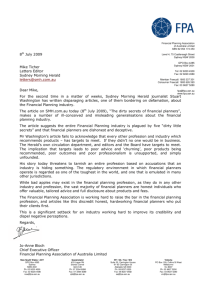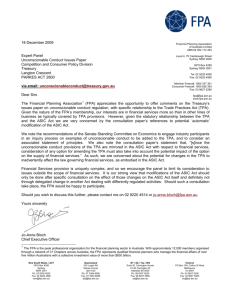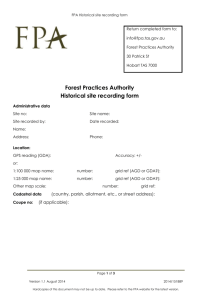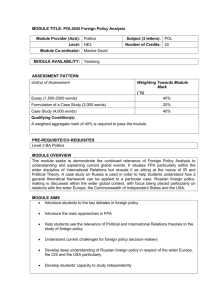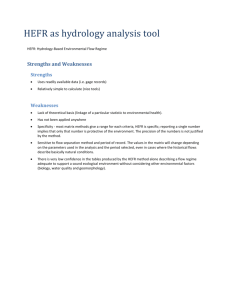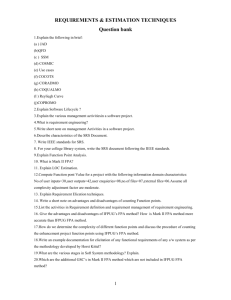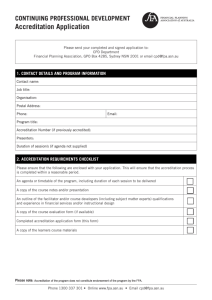Review of Australia's Consumer Policy Framework Productivity
advertisement
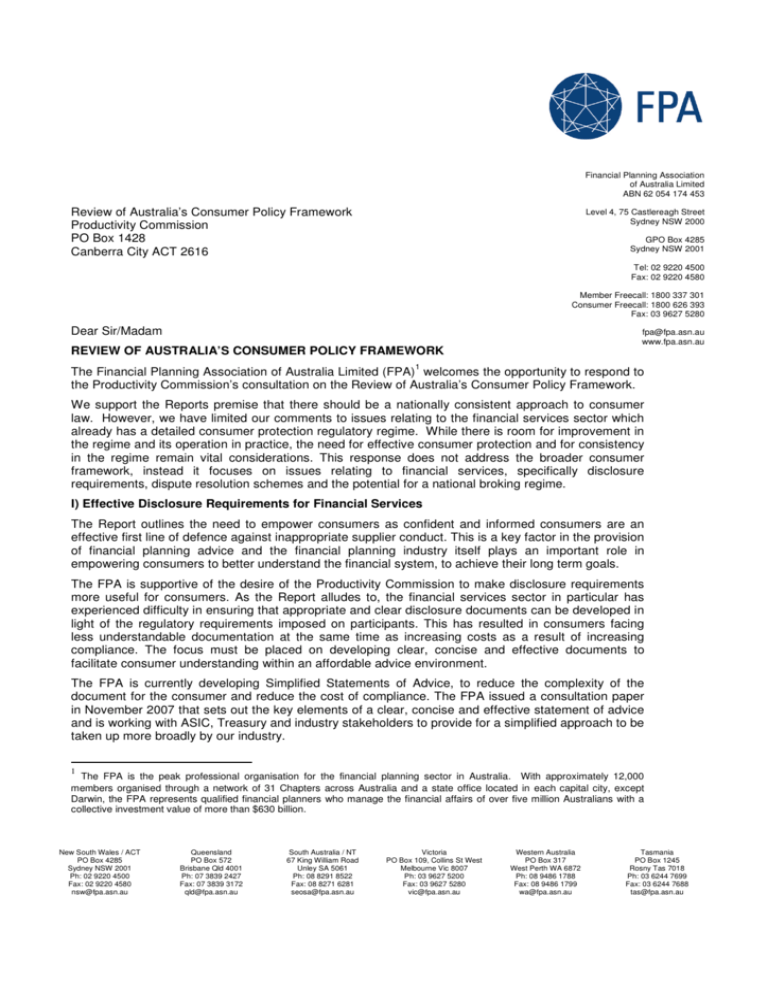
Financial Planning Association of Australia Limited ABN 62 054 174 453 Review of Australia’s Consumer Policy Framework Productivity Commission PO Box 1428 Canberra City ACT 2616 Level 4, 75 Castlereagh Street Sydney NSW 2000 GPO Box 4285 Sydney NSW 2001 Tel: 02 9220 4500 Fax: 02 9220 4580 Member Freecall: 1800 337 301 Consumer Freecall: 1800 626 393 Fax: 03 9627 5280 Dear Sir/Madam fpa@fpa.asn.au www.fpa.asn.au REVIEW OF AUSTRALIA’S CONSUMER POLICY FRAMEWORK 1 The Financial Planning Association of Australia Limited (FPA) welcomes the opportunity to respond to the Productivity Commission’s consultation on the Review of Australia’s Consumer Policy Framework. We support the Reports premise that there should be a nationally consistent approach to consumer law. However, we have limited our comments to issues relating to the financial services sector which already has a detailed consumer protection regulatory regime. While there is room for improvement in the regime and its operation in practice, the need for effective consumer protection and for consistency in the regime remain vital considerations. This response does not address the broader consumer framework, instead it focuses on issues relating to financial services, specifically disclosure requirements, dispute resolution schemes and the potential for a national broking regime. I) Effective Disclosure Requirements for Financial Services The Report outlines the need to empower consumers as confident and informed consumers are an effective first line of defence against inappropriate supplier conduct. This is a key factor in the provision of financial planning advice and the financial planning industry itself plays an important role in empowering consumers to better understand the financial system, to achieve their long term goals. The FPA is supportive of the desire of the Productivity Commission to make disclosure requirements more useful for consumers. As the Report alludes to, the financial services sector in particular has experienced difficulty in ensuring that appropriate and clear disclosure documents can be developed in light of the regulatory requirements imposed on participants. This has resulted in consumers facing less understandable documentation at the same time as increasing costs as a result of increasing compliance. The focus must be placed on developing clear, concise and effective documents to facilitate consumer understanding within an affordable advice environment. The FPA is currently developing Simplified Statements of Advice, to reduce the complexity of the document for the consumer and reduce the cost of compliance. The FPA issued a consultation paper in November 2007 that sets out the key elements of a clear, concise and effective statement of advice and is working with ASIC, Treasury and industry stakeholders to provide for a simplified approach to be taken up more broadly by our industry. 1 The FPA is the peak professional organisation for the financial planning sector in Australia. With approximately 12,000 members organised through a network of 31 Chapters across Australia and a state office located in each capital city, except Darwin, the FPA represents qualified financial planners who manage the financial affairs of over five million Australians with a collective investment value of more than $630 billion. New South Wales / ACT PO Box 4285 Sydney NSW 2001 Ph: 02 9220 4500 Fax: 02 9220 4580 nsw@fpa.asn.au Queensland PO Box 572 Brisbane Qld 4001 Ph: 07 3839 2427 Fax: 07 3839 3172 qld@fpa.asn.au South Australia / NT 67 King William Road Unley SA 5061 Ph: 08 8291 8522 Fax: 08 8271 6281 seosa@fpa.asn.au Victoria PO Box 109, Collins St West Melbourne Vic 8007 Ph: 03 9627 5200 Fax: 03 9627 5280 vic@fpa.asn.au Western Australia PO Box 317 West Perth WA 6872 Ph: 08 9486 1788 Fax: 08 9486 1799 wa@fpa.asn.au Tasmania PO Box 1245 Rosny Tas 7018 Ph: 03 6244 7699 Fax: 03 6244 7688 tas@fpa.asn.au II) Dispute Resolution Schemes The Report suggests the implementation of a single financial services Alternative Dispute Resolution (ADR) Scheme rather than the range of schemes that currently exist, with independence retained through existing schemes operating discretely within a combined entity. The FPA agrees that providing consumers with effective access to remedies is an important aspect to consider within the financial sector. We also welcome the recent decision to rationalise three key financial services dispute resolution schemes. However, we do not advocate a specific institutional structure for the operation of such schemes. Of greater consequence to the FPA is that the scheme is cost effective and efficient in terms of its processes. Further it is imperative that the scheme is transparent for all participants in terms of its decision making. If these requirements are adhered to, the scheme is likely to gain wide support from industry and consumers alike. Ultimately the structures in place will need to have the capacity to work co-operatively with different parts of industry and to deal with complexities associated with the financial services industry. III) The regulation of finance brokers The FPA supports the Report’s recommendations to introduce a licensing regime for finance brokers as part of the transfer of consumer credit to the national level and incorporation in the financial services regime administered by ASIC. The scheme should include the regulation of all types of broking structures including mortgage brokers, finance brokers and single line brokers. We suggest that financial advisers already licensed and authorised under the Corporations Act should not be required to seek additional licensing requirements. Preference for a Federally Based Regime Administered by ASIC The FPA strongly favours the introduction of a federally based regulatory regime for finance broking, and as stated above, considers that national regulation should be achieved by incorporating finance broking into the FSR regime. It is crucial that the regime established is administered at a national not a state level. A federal regime has advantages over a State based model. It ensures consistency in regulation and uniformity across the country in the regulation of issues which are of a national interest. Even if the regime initially is consistent, the ability for jurisdictions to take different interpretations or respond to specific events in dissimilar ways risks a divergence over time. A federal regime also minimises the need to deal with other problematic issues including the portability of licenses, the potential duplication of requirements, differences in training requirements, and administrative inefficiencies. These issues are particularly important given the national structure of financial services firms, and given it is not uncommon for finance brokers to move between States. There is no necessity for a separate licensing system for finance brokers outside of the FSR regime. The requirements of an Australian Financial Services Licence attach extensive compliance and disclosure obligations to the provision of product related advice which are aimed at protecting the interests of consumers. These obligations come at a cost that is not borne by those providing unregulated advice. Consistency in regulatory requirements will in the long run be of benefit to consumers. Duplication of licensing may otherwise become an issue if a separate regime was established. Bringing finance brokers and credit providers under the FSR umbrella would create a level playing field such that finance brokers that are giving the equivalent of financial product advice would be subject to the same 2 disclosure and training requirements as financial planners providing advice of a similar nature. Access to external dispute resolution schemes and professional indemnity insurance could also be ensured. Disclosure As with financial services, investors in facilities provided by finance brokers should have all the information disclosed to them that is necessary in order to make an informed decision. However it is important that the regulation of finance broking is commensurate with the risks posed to consumers by finance broking activity, and not excessive, related to the margins operating within the business. When determining disclosure requirements, it may be appropriate for finance brokers to provide more streamlined disclosure documentation, depending on the complexity of the product about which advice is being given. Whatever the case, the disclosure document should still retain key features such as adhering to ‘reasonable basis of advice’ obligations, providing details concerning remunerations, and highlighting instances where there is a close relationship with other parties to the transaction. Training Possible requirements to satisfy training and experience criteria could include obligations similar to ASIC’s Regulatory Guide 146 Licensing: Training of Financial Product Advisers (RG146). There would be potential for industry bodies to develop courses for RG146 accreditation and Continuing Professional Development (CPD). There may also be scope to develop tools such as voluntary industry codes to work in conjunction with the new regime. External Dispute Resolution Schemes Finance Brokers and their representatives should be required to be members of an approved EDR scheme at the time they apply for their broking license and for the term of the licence. This is an important aspect of ensuring that consumers are adequately protected with access to free alternative dispute resolution. If membership of these schemes remains optional then consumers will not be protected from less reputable brokers. Professional Indemnity Insurance The FPA considers that finance brokers should have mandatory equivalent and compatible PI requirements to those established for financial advisers or alternative comparable arrangements approved by ASIC. If you would like to discuss any of the issues raised in this letter, please contact our Policy and Government Relations Manager, Gerard Fitzpatrick (tel: 02 9220 4513; email gerard.fitzpatrick@fpa.asn.au). Yours faithfully, Jo-Anne Bloch Chief Executive Officer 3
